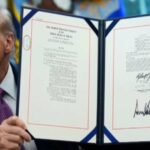In a significant judicial ruling, a federal judge in California declared that the efforts by the Trump administration to terminate the Temporary Protected Status (TPS) for a substantial number of migrants from Venezuela and Haiti were illegal. This decision underscores a critical juncture in the ongoing debate and legal battles surrounding immigration policies in the United States, particularly those established or modified under former President Donald Trump.
The ruling came in the wake of lawsuits filed by advocacy groups representing the interests of migrants from these countries. They argued that the administration’s decision to end the protections was motivated not by legitimate policy considerations but by racial animus, and that it failed to consider the dire conditions in these countries that originally justified the protections under TPS.
Temporary Protected Status is a federal designation, bestowed by the Department of Homeland Security, which can be granted to nationals of countries experiencing severe conditions such as ongoing armed conflict, environmental disasters, or extraordinary and temporary conditions that make it unsafe for their citizens to be returned home. Once granted TPS, individuals are not removable from the United States, can obtain an employment authorization document (EAD), and may be granted travel authorization.
For many Haitians, TPS was granted following the devastating earthquake in 2010 that left the country in ruins, compounding challenges including widespread poverty, political instability, and insufficient infrastructure. Venezuelans were granted TPS more recently, as the country slid into political and economic turmoil under Nicolás Maduro’s regime, characterized by intense political persecution, human rights abuses, and an economy in freefall that spurred mass migration.
The termination of TPS for these groups was part of a broader immigration policy overhaul by the Trump administration, which sought to reduce the number of immigrants to the United States across various programs. The administration argued that the conditions in Haiti and Venezuela had improved sufficiently to end their TPS designations. However, critics contended that this assessment was grossly inaccurate and disregarded the still-precarious conditions in both countries.
The federal judge’s decision to block the termination of TPS for Venezuelans and Haitians highlights the judiciary’s role in scrutinizing the executive’s decisions on immigration. The court found that the rationale provided by the Trump administration for ending these protections was insufficient and possibly tainted by unconstitutional motivations. Additionally, extensive testimonies and evidence presented by the plaintiffs showcased that the original conditions that necessitated the TPS designation for these countries had not fundamentally changed, if not worsened, particularly in the face of new crises, such as the COVID-19 pandemic.
The impact of the ruling is extensive, affecting potentially hundreds of thousands of migrants. For many, the decision means a reprieve from the fear of deportation and a continuation of the ability to work and live in the U.S., providing crucial stability both for them and for their families, including many U.S. citizen children.
Aside from the immediate legal and personal ramifications, the ruling also carries significant political and social implications. It sends a strong message about the necessity of grounding immigration policy decisions in accurate, unbiased assessments of conditions in origin countries. Additionally, it underscores the importance of the TPS program in upholding America’s humanitarian commitments and values, especially regarding protecting vulnerable populations from being returned to conditions where their safety and well-being could be at risk.
Furthermore, this case reiterates the enduring debates and challenges that come with interpreting and implementing immigration laws and policies. The use of judicial power to check executive decisions is a fundamental aspect of the U.S. democratic system and is particularly pivotal in contentious areas such as immigration.
Looking forward, the administration faced with this ruling must reconsider its approach not only to TPS but potentially to other immigration policies criticized as part of its broader restrictive agenda. The outcome may also influence how future administrations handle similar decisions, weighing the human impact against the often fluctuating political pressures surrounding immigration issues.
Migrant advocacy groups hailed the ruling as a crucial victory for human rights and the rule of law. They continue to campaign for more permanent solutions for TPS recipients, such as an opportunity to seek lawful permanent resident status. These groups argue that many TPS recipients have lived, worked, and raised families in the U.S. for years and deserve a chance to secure a more stable and permanent status in their adopted country.
In conclusion, the federal court’s blocking of the Trump administration’s attempt to end TPS for Venezuelan and Haitian migrants is a landmark decision. It not only preserves the safety and stability of hundreds of thousands of individuals and families but also reinforces key legal and ethical principles guiding U.S. immigration policy. It remains to be seen how this decision will affect future policy directions, but it certainly sets a precedent in the ongoing discourse on the rights, contributions, and treatments of migrants in America.









